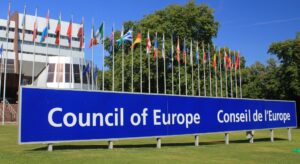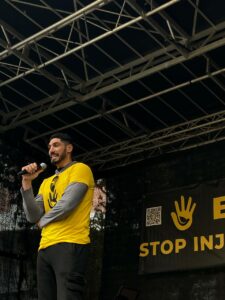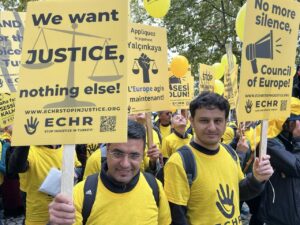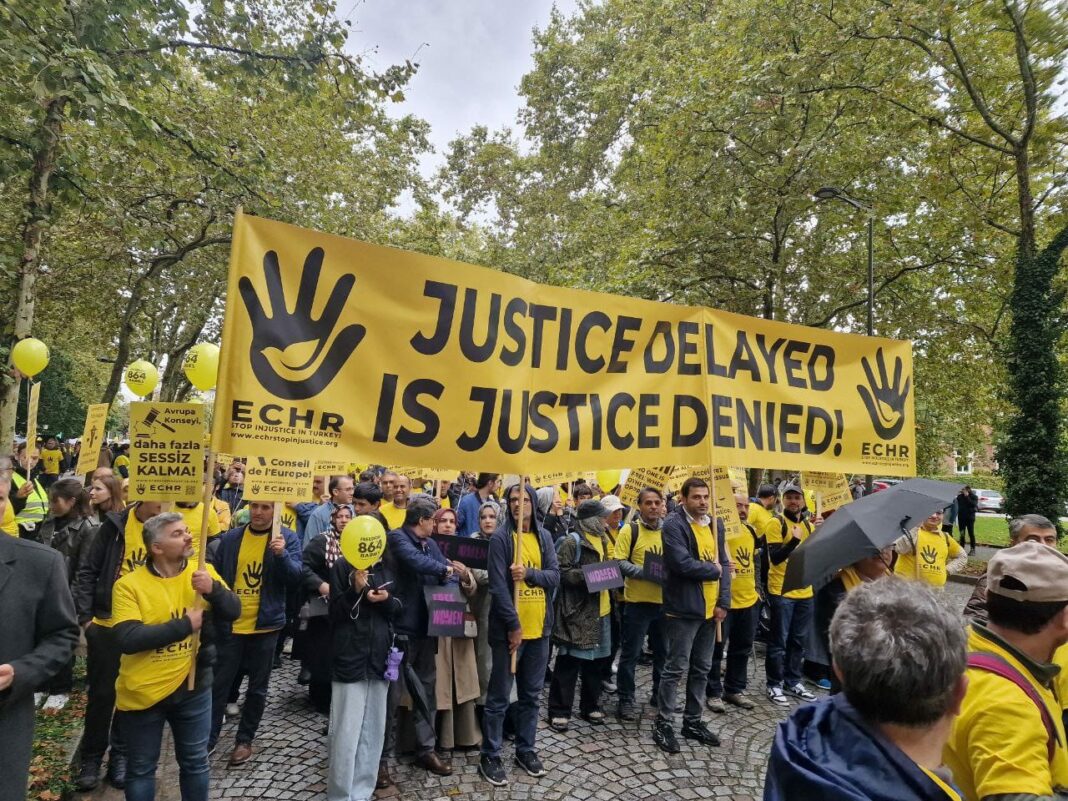Bünyamin Tekin, Strasbourg
More than 2,000 Turkish expatriates and human rights activists gathered in front of the Council of Europe headquarters in Strasbourg on Wednesday to demand justice for the victims of human rights violations in Turkey.
The demonstration aimed to draw attention to the ongoing rights abuses in Turkey that escalated after an abortive putsch in 2016, when the government launched a crackdown on non-loyalist citizens under the pretext of an anti-coup fight that has continued unabated despite key rulings by the European Court of Human Rights’ (ECtHR), and to urge the CoE and the ECtHR to take swift action against them.
The protest was organized by the Peaceful Actions Platform, an umbrella organization of 24 civil society groups, and marked the third such gathering at the ECtHR in recent years, with previous protests held in 2022 and 2023.
Protesters accuse the Council of Europe, tasked with overseeing the implementation of ECtHR rulings, of not applying sufficient pressure on Ankara to abide by court decisions that are favorable to the victims. The ECtHR is also criticized for failing to process victims’ applications expeditiously and, in some cases, issuing rulings in favor of the Turkish government.
Calls for justice amid defiance of ECtHR rulings
At the center of the protest was Turkey’s refusal to comply with landmark ECtHR rulings, particularly in the cases of imprisoned philanthropist Osman Kavala, Kurdish leader Selahattin Demirtaş and former teacher Yüksel Yalçınkaya. In each case, the ECtHR had found violations of their fundamental rights, but the Turkish government has refused to implement these rulings and continues its crackdown on opposition groups and perceived dissidents.
Kavala and Demirtaş, high-profile figures who have been imprisoned for years on politically motivated charges, have become symbols of the Turkish government’s growing authoritarianism and its disregard for judicial independence. In both cases the ECtHR had ruled that Turkey’s actions violated their rights to a fair trial and freedom of expression; yet the Turkish authorities have ignored these judgments.
More recently, in September 2023, the Grand Chamber of the ECtHR ruled in favor of Yalçınkaya, finding that Turkey had violated his rights under three articles of the European Convention on Human Rights. Despite this, a local court in Kayseri re-convicted Yalçınkaya last month on terrorism charges, sentencing him to the same six years and three months in prison as his original 2017 conviction. The ruling was based on his alleged use of a messaging app, membership in a labor union linked to the faith-based Gülen movement and his account at Bank Asya, all of which were classified by Turkish courts as evidence of terrorist activities.
The Gülen movement, inspired by Turkish cleric Fethullah Gülen, is accused by the Turkish government and President Recep Tayyip Erdoğan of masterminding the failed coup and is designated as a “terrorist organization,” although the movement denies involvement in the coup attempt or any terrorist activity.
Despite the ECtHR ruling that ordered the Turkish government to redress Yalçınkaya as well as submit an action plan to address systemic issues that resulted in thousands of unjust convictions, detentions and prosecutions of alleged Gülen followers continue based on activities that have been classified as criminal by Turkish courts, but not by the ECtHR.
Protesters say this defiance of ECtHR rulings by Turkish authorities shows that Turkey’s courts continue to act in accordance with government directives rather than international legal standards.

However, the Council of Europe’s Committee of Ministers has been ignoring calls to speed up the monitoring of Turkey’s compliance with the ECtHR judgements.
Personal stories highlight the ongoing repression
Following the abortive putsch, the Turkish government declared a state of emergency and carried out a massive purge of state institutions under the pretext of an anti-coup fight. More than 130,000 public servants, including 4,156 judges and prosecutors, as well as 29,444 members of the armed forces were summarily removed from their jobs for alleged membership in or relationships with “terrorist organizations” by emergency decree-laws subject to neither judicial nor parliamentary scrutiny.
Since the coup attempt, a total of 705,172 people have been investigated on terrorism or coup-related charges due to their alleged links to the movement. There are currently 13,251 people in prison who are in pretrial detention or convicted of terrorism in Gülen-linked trials.
Thousands of other Gülen movement followers had to flee Turkey to avoid the government crackdown. Some of these people had to take illegal and risky journeys in boats to Greece because their passports had been revoked by the government.
Thousands of victims of the purge in Turkey have gathered in Strasbourg, demanding justice and the enforcement of ECHR rulings.
It’s time for the Council of Europe to uphold human rights and protect the rule of law. #CouncilOfEuropeStandUppic.twitter.com/50tYhi41G0
— Davut Akca (@DrDavutAkca) October 2, 2024
Among the speakers at the protest were individuals who have been personally affected by the crackdown, providing a human face to the systemic repression described by international observers.
Plea for justice
Ceyda Eroğlu was arrested while eight months pregnant in May 2022. Despite Turkish law stating that pregnant women cannot be incarcerated, Eroğlu was sent to Edirne Prison, where she endured harsh conditions. She described the unsanitary environment, with rats and crumbling walls and limited access to water, all while fearing for her unborn child.
“I had no idea how I would give birth safely in prison,” Eroğlu told the crowd. “Every day was filled with stress and anxiety. But outside, people were fighting for me. Thousands of tweets were posted to bring attention to my situation.”
Ceyda Nur Eroğlu, who gave birth while in prison, is saying 'Justice Should Not Be Delayed' in Strasbourg together with her 2-year-old son Tarık.
AdaletGecikmez #CouncilOfEuropeStandUp pic.twitter.com/yhkQtppeDr
— Voice Of Women Platform (@VoiceOfWomenW) October 2, 2024
Eventually, Eroğlu went into labor and was taken to the hospital. Thanks to the efforts of thousands of supporters, she was unexpectedly released after giving birth.
“My story ended this way, but there are thousands of women whose stories haven’t ended yet,” she said. “There are hundreds of women in prison right now, deprived of basic medical care, locked up simply for their political beliefs.”
Eroğlu called on European institutions to pressure Turkey to stop these human rights violations, saying, “We must continue this fight until justice is served.”
Enes Kanter Freedom: a call for international solidarity
Former NBA player Enes Kanter Freedom, who has lived in exile in the United States since his Turkish passport was revoked in 2017, also addressed the crowd. Kanter has been an outspoken critic of Turkey’s human rights abuses, particularly against members of the Gülen movement, with which he is associated.

“We have to put pressure on governments and organizations to take action,” Kanter said. “Our brothers and sisters are suffering over there, and the world cannot remain silent.”
Kanter emphasized the importance of international solidarity. “Thank you for being here and being their voice. You are becoming the voice of all those voiceless people,” he said.
A mother’s grief and fight for justice
Zekiye Ataç’s son, Ahmet Burhan Ataç, was just 8 years old when he died of cancer in 2020. His illness was exacerbated by the separation from his father, who was imprisoned, and by a travel ban on his mother, which delayed his receiving treatment abroad.

Speaking at the protest, Ataç shared her grief, saying, “It’s been four years since Ahmet passed away, but many more children like him have been left without their parents since then. We are here to say ‘enough’ to this. We are here to be the voice of children like Ahmet and for those left without their parents.”
Ataç also expressed hope for the future, saying, “We hope that next year we won’t need to come here again—that democracy will return to our country and that the rule of law will prevail.”
A harrowing escape across the Evros River
Kürşat Alcı, a former teacher, recounted his dangerous escape from Turkey with his family across the Evros River, which forms part of the border with Greece. Alcı’s boat capsized, leaving him, his wife and two daughters stranded on an island for four days without food or water.
“We survived by drinking the river water for four days,” Alcı said. “Eventually, the Greek military rescued us.”
Alcı’s story is just one of many similar accounts from Turkish dissidents who have risked their lives to flee their homeland. “We had no choice,” he said. “It was either stay and face unjust imprisonment or risk everything to find freedom.”

Sakis MITROLIDIS / AFP
Moldovan MP Constantin Starîș, a member of the Parliamentary Assembly of the Council of Europe (PACE), also spoke at the protest, emphasizing the importance of standing in solidarity with those affected by human rights violations.
“I am here as Moldova’s representative to the Council of Europe,” Starîș said. “There are also unimplemented ECtHR rulings related to my country. This is why we must stand together. We need to hold governments accountable to ensure that these rulings are enforced.”
Speaking truth to power
Author and human rights advocate Hilal Nesin also addressed the crowd, delivering a fiery speech in which she criticized the Turkish government and the global inaction toward its human rights violations.
“If people are dying under the initiative of the president in a country, the murderer is that person,” Nesin said. “You didn’t deserve what was done to you. None of you were terrorists.”
Nesin urged the protesters to keep fighting for justice: “Next year, you’ll be five thousand, maybe ten thousand. I believe everything will get better.”
Protesters urge immediate action from the CoE and ECtHR
In addition to the speeches, protesters delivered letters to the highest-ranking officials of the Council of Europe and the ECtHR, including Council of Europe Commissioner for Human Rights Michael O’Flaherty and ECtHR President Marko Bošnjak. These letters detailed the widespread human rights violations in Turkey, calling for immediate action to ensure that Turkey complies with ECtHR rulings and addresses the systemic issues that have led to mass detentions, torture and extrajudicial killings.

The letters also emphasized that the Council of Europe and the ECtHR, as key guardians of human rights in Europe, have a moral and legal obligation to act quickly in response to Turkey’s abuses. Protesters warned that continued inaction would weaken the integrity of the European human rights system and embolden authoritarian regimes around the world.
The day’s events, which included mini-concerts and other activities, concluded with a renewed call for the CoE and ECtHR to take immediate action. “Justice delayed is justice denied,” the crowd chanted as they marched, vowing to continue their fight until justice is served.
The Peaceful Actions Platform reiterated its demands for the CoE to enforce ECtHR rulings, particularly in the Yalçınkaya case, and for Turkey to cease its ongoing crackdown on dissidents. The group emphasized that they would continue their efforts until victims of the post-coup purge receive the justice they deserve.
“We will not stop until justice is done,” a representative of the platform said. “Turkey must be held accountable for its actions, and European institutions must do their part to ensure that human rights are protected.”



